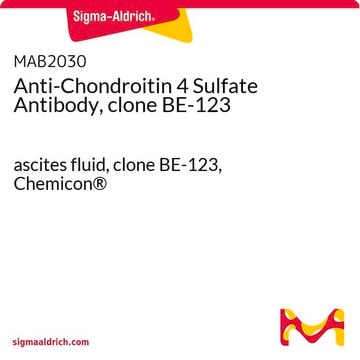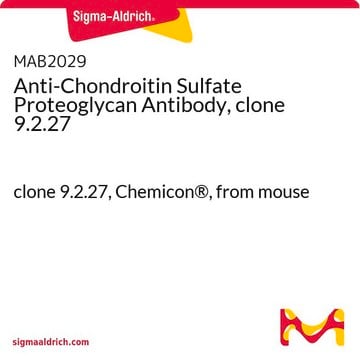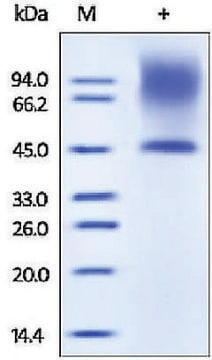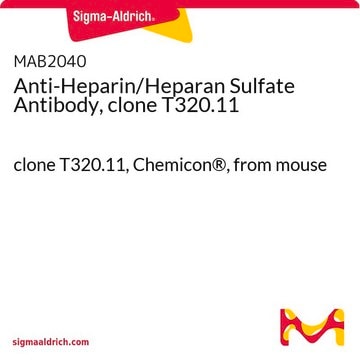Fontos dokumentumok
SAB4200696
Anti-Chondroitin Sulfate antibody, Mouse monoclonal
clone CS-56, purified from hybridoma cell culture
Szinonimák:
CSPG, chondroitin sulfate proteoglycan
About This Item
IHC
immunohistochemistry: 2.5-5 μg/mL using heat-retrieved formalin-fixed, paraffin-embedded human colon cancer sections and Biotin/ExtrAvidin ®-Peroxidase staining system.
Javasolt termékek
biológiai forrás
mouse
Minőségi szint
antitest forma
purified from hybridoma cell culture
purified immunoglobulin
antitest terméktípus
primary antibodies
klón
CS-56, monoclonal
Forma
buffered aqueous solution
faj reaktivitás
mouse, chicken, bovine, human
kiszerelés
antibody small pack of 25 μL
koncentráció
~1 mg/mL
technika/technikák
immunofluorescence: 2.5-5 μg/mL using bovine BMGE cells
immunohistochemistry: 2.5-5 μg/mL using heat-retrieved formalin-fixed, paraffin-embedded human colon cancer sections and Biotin/ExtrAvidin ®-Peroxidase staining system.
izotípus
IgM
kiszállítva
dry ice
tárolási hőmérséklet
−20°C
célzott transzláció utáni módosítás
unmodified
Géninformáció
human ... CSPG4(1464)
Általános leírás
Chondroitin sulfate proteoglycan 4 (CSPG4) or nerve/glial antigen 2 (NG2) is encoded by the gene mapped to human chromosome 15q24.2-15q24.3. It is a growth-inhibitory chondroitin sulfate proteoglycan (CSPG) produced after spinal cord injury. It has a single glycosaminoglycan (GAG) chain. The protein belongs to the transmembrane chondroitin sulfate proteoglycans family.
Immunogén
Biokémiai/fiziológiai hatások
Fizikai forma
Tárolás és stabilitás
Egyéb megjegyzések
Jogi információk
Jogi nyilatkozat
Nem találja a megfelelő terméket?
Próbálja ki a Termékválasztó eszköz. eszközt
Tárolási osztály kódja
12 - Non Combustible Liquids
WGK
WGK 1
Lobbanási pont (F)
Not applicable
Lobbanási pont (C)
Not applicable
Válasszon a legfrissebb verziók közül:
Analitikai tanúsítványok (COA)
Nem találja a megfelelő verziót?
Ha egy adott verzióra van szüksége, a tétel- vagy cikkszám alapján rákereshet egy adott tanúsítványra.
Már rendelkezik ezzel a termékkel?
Az Ön által nemrégiben megvásárolt termékekre vonatkozó dokumentumokat a Dokumentumtárban találja.
Az ügyfelek ezeket is megtekintették
Therapeutic Target in Malignant Cancer
Tudóscsoportunk valamennyi kutatási területen rendelkezik tapasztalattal, beleértve az élettudományt, az anyagtudományt, a kémiai szintézist, a kromatográfiát, az analitikát és még sok más területet.
Lépjen kapcsolatba a szaktanácsadással















